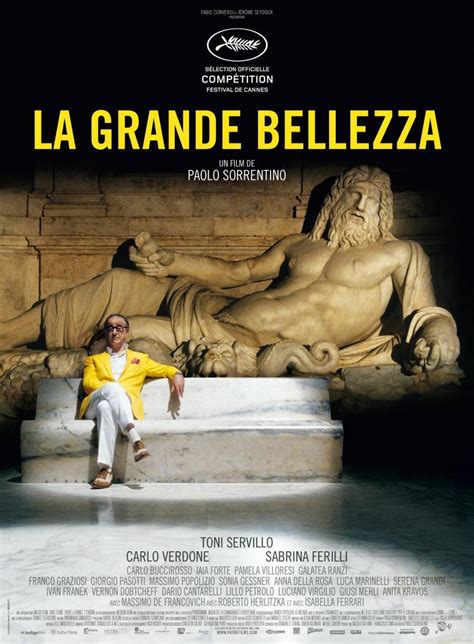The Great Beauty, a 2013 Italian film directed by Paolo Sorrentino, is a mesmerizing exploration of the human condition, delving into themes of identity, morality, and the search for meaning in a world of opulence and excess. This cinematic masterpiece weaves a complex narrative that is both a critique of the Italian upper class and a poignant reflection on the transience of life.
At the heart of the film is Jep Gambardella, a charismatic and sophisticated journalist in his 60s, played by Toni Servillo, who has made a name for himself as a chronicler of Rome’s high society. Jep’s life is a whirlwind of parties, women, and intellectual pursuits, yet beneath his polished exterior lies a deep sense of ennui and disillusionment. As he navigates the rarefied world of Rome’s elite, Jep finds himself at a crossroads, questioning the values and principles that have guided his life thus far.
One of the defining features of The Great Beauty is its stunning cinematography, which captures the Eternal City in all its glory. From the grand vistas of the Colosseum to the intimate recesses of Jep’s luxurious apartment, the film is a visual feast that showcases the beauty and decadence of Rome. Sorrentino’s use of long takes, intricate camera movements, and a vibrant color palette creates a dreamlike atmosphere, drawing the viewer into Jep’s world of privilege and excess.
As Jep grapples with the search for meaning in his life, he embarks on a journey of self-discovery, encountering a cast of characters who challenge his perceptions and force him to confront the emptiness of his existence. There’s Ramona, the alluring and enigmatic woman who serves as a catalyst for Jep’s introspection; Stefano, the cynical and world-weary friend who offers a glimpse into the abyss of despair; and Father Vincenzo, the ascetic priest who embodies a profound sense of spirituality and purpose.
Through these encounters, Sorrentino masterfully explores the tensions between appearance and reality, revealing the façade of Rome’s high society to be a fragile construct, masking the insecurities, fears, and desires of its protagonists. The film’s portrayal of the upper class is both a scathing critique of their superficiality and a nuanced exploration of their humanity, acknowledging the complexities and contradictions that underlie their privileged existence.
The Great Beauty is also a film about the power of art to transcend the mundane and speak to our deepest aspirations. Jep’s writing, though dormant for many years, serves as a metaphor for the creative impulse that lies at the heart of human expression. As he begins to write again, Jep rediscovers a sense of purpose, and the film becomes a testament to the transformative power of art to illuminate our lives and connect us with something greater than ourselves.
In conclusion, The Great Beauty is a cinematic tour de force that invites viewers to immerse themselves in the world of Rome’s elite, while also prompting them to reflect on the deeper questions of existence. Through its stunning visuals, complex characters, and nuanced exploration of the human condition, the film offers a rich and rewarding experience that lingers long after the credits roll.
As you delve into the world of The Great Beauty, you may find yourself pondering the following questions:
What is the central theme of The Great Beauty?
+The central theme of The Great Beauty is the search for meaning and identity in a world of opulence and excess, as embodied by the protagonist Jep Gambardella.
How does the film portray the Italian upper class?
+The film offers a nuanced portrayal of the Italian upper class, critiquing their superficiality while also acknowledging their humanity and complexities.
What role does art play in the film?
+Art serves as a metaphor for the creative impulse and the transformative power of human expression, as embodied by Jep's writing and the film's stunning cinematography.
In exploring the world of The Great Beauty, you may also consider the following perspectives:
- Historical context: The film is set in contemporary Rome, but its themes and characters are rooted in the city’s rich history and cultural heritage.
- Philosophical insights: The film’s exploration of identity, morality, and the search for meaning resonates with philosophical traditions, from existentialism to humanism.
- Cinematic influences: Sorrentino’s direction and the film’s visual style draw on a range of cinematic influences, from Fellini to Antonioni, reflecting the evolution of Italian neorealism and beyond.
Ultimately, The Great Beauty is a film that invites you to embark on a journey of self-discovery, to question the values and principles that guide your life, and to seek meaning in a world of beauty and excess. As you immerse yourself in the world of Jep Gambardella, you may find that the film’s themes and characters linger long after the credits roll, offering a profound and lasting reflection on the human condition.



